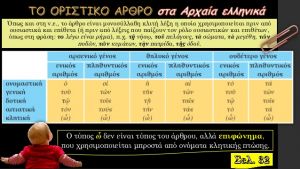Language/Ancient-greek-to-1453/Grammar/Ancient-Greek-cases
The Greek article with three genders and three numbers[edit | edit source]
In Ancient greek there are five cases each have different functions.: the nominative, genitive, dative, accusative, and vocative.
In Ancient Greek, case tells the reader the grammatical function of each word in the sentence.
Nominative[edit | edit source]
The Ancient Greek nominative, is used for the subject and for things describing the subject (predicate nouns or adjectives):
- Σωκράτης γὰρ σοφὸς ἦν καὶ δίκαιος.
Sōkrátēs gàr sophòs ên kaì díkaios.
"For Socrates was wise and just."
Genitive[edit | edit source]
The genitive expresses the relationships between nouns and can usually be translated along with the English word 'of' or 'from'.
- ἡ τοῦ Καίσαρος γυνή.
hē toû Kaísaros gunḗ.
"The wife of Caesar."
It is also used after prepositions, especially those which mean "from":
- ἀπῆλθεν ἐκ τῆς ἀγορᾶς.
apêlthen ek tês agorâs.
"He went away from the market-place."
Dative[edit | edit source]
The dative is is used for three purposes:
1. as the indirect object of a verb
2. how or with what something is done.
3. relationships of place where and time when
4. These relationships can be expressed by the English prepositions to or for, with or by, and in or at.
The dative corresponds and expresses the person or thing that is indirectly affected by an action, and can often be translated with the prepositions "to" or "for":
- λέγει τὴν μαντείαν τῷ Σωκράτει.
légei tḕn manteían tôi Sōkrátei.
"He tells the oracle to Socrates."
When the dative corresponds to the Proto-Indo-European instrumental, it expresses the thing with which something is done,
and can often be translated by the preposition "with":
- ἔβαλλέ με λίθοις
éballé me líthois
"He was hitting me with stones."
When the dative corresponds locative case (this is often the case when it is used with prepositions), it expresses location (sometimes figuratively) or time,
and can often be translated by "in", "at", or "on":
- τρίτῳ ἔτει ὡμολόγησαν Ἀθηναίοις.
trítōi étei hōmológēsan Athēnaíois.
"In the third year they came to an agreement with the Athenians."
The dative is also frequently used after prepositions, such as ἐν (en) "in":
- ἐν τῇ μάχῃ ἀπέθανεν.
en têi mákhēi apéthanen.
"He died in the battle."
Accusative [edit | edit source]
The accusative is used for the object of a transitive verb, and also after prepositions. After prepositions it is often used for the destination of motion:
- πέμπουσιν ἐς Κρήτην ἀγγέλους
pémpousin es Krḗtēn angélous
"They send messengers to Crete."
Vocative[edit | edit source]
The vocative is is for exclamations and emphatic address used for addressing people or things. It is frequently the same as the nominative
in the singular and always the same in the plural.
- ἀληθῆ λέγεις, ὦ Σώκρατες
alēthê légeis, ô Sṓkrates
"What you say is true, Socrates."
Declination table[edit | edit source]
| Singulier | Pluriel | Duel | |||||||
|---|---|---|---|---|---|---|---|---|---|
| M | F | N | M | F | N | M | F | N | |
| N | ὁ | ἡ | τὸ | οἱ | αἱ | τὰ | τὼ | τὼ | τὼ |
| G | τοῦ | τῆς | τοῦ | τῶν | τῶν | τῶν | τοῖν | τοῖν | τοῖν |
| D | τῷ | τῇ | τῷ | τοῖς | ταῖς | τοῖς | τοῖν | τοῖν | τοῖν |
| A | τὸν | τὴν | τὸ | τοὺς | τὰς | τὰ | τὼ | τὼ | τὼ |
| V | - | - | - | - | - | - | - | - | - |
Author[edit source]
- Ευγενική χορηγία που στοχεύει να βοηθήσει μαθητές ή μη, απανταχού της Γης, που επιδίδονται στην εκμάθηση της ελληνικής γλώσσας!
- Contribution bénévole visant à aider les personnes, partout dans le monde, qui sont engagées dans l'apprentissage de la langue grecque !
- Voluntary contribution aimed at helping people, all over the world, who are committed to learning the Greek language!
Other Lessons[edit | edit source]
- Ancient Greek Interjections
- Ancient Greek Adjectivess
- The verb : εἰμί
- Reciprocal Pronouns
- Reflexive Pronouns
- Defined or repetitive pronoun
- Orthographic signs: Spirits
- The verb have (ἔχω)
- Aspect in the Ancient Greek Verb

